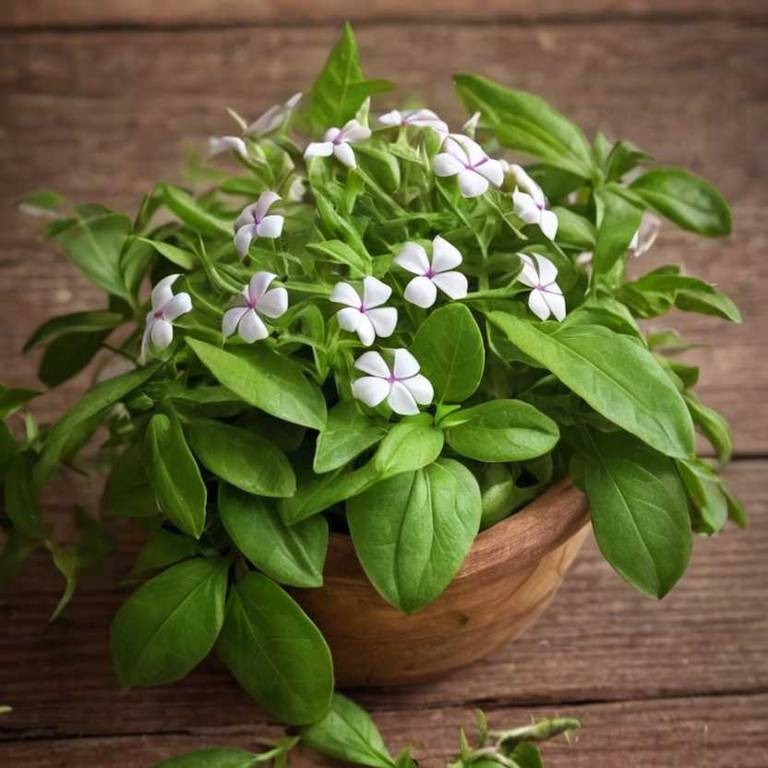By Leen Randell
Updated: Jul 20, 2024
10 Medicinal Constituents Of Catharanthus Roseus (Madagascar Periwinkle)

Catharanthus roseus, also known as Madagascar periwinkle, has active constituents such as alkaloids, particularly vinblastine and vincristine.
These compounds exhibit potent anti-cancer properties, inhibiting cell division and inducing apoptosis. The medicinal properties of these constituents have improved the lives of thousands by increasing survival rates and remission times for patients with leukemia and lymphoma.
Additionally, vinblastine has been used to treat Hodgkin's lymphoma and other blood cancers, providing hope for those suffering from these diseases.
This article explains in details the 10 best active constituents of Catharanthus roseus.
1. Vinblastine
Catharanthus roseus, also known as Madagascar periwinkle, vinblastine is a valuable alkaloid extracted from its leaves.
It is a semisynthetic derivative of vincristine and has been widely used in the treatment of various types of cancer, including Hodgkin's disease, non-Hodgkin lymphoma, and testicular carcinoma.
Vinblastine inhibits cell division by interfering with microtubule formation, ultimately leading to apoptosis or programmed cell death.
2. Vincristine
Catharanthus roseus, also known as Madagascar periwinkle, vincristine is a powerful alkaloid extracted from the leaves and stems of the plant.
It is a highly effective chemotherapy agent used to treat various types of cancer, including leukemia, lymphoma, and solid tumors.
Vincristine has been shown to be effective in inducing remission and improving survival rates for patients with these diseases, making it an important component of combination chemotherapy regimens.
3. Serpentinine
Catharanthus roseus, also known as Madagascar periwinkle, serpentinine is a unique alkaloid compound extracted from the plant's leaves and stems.
It has been found to possess a range of bioactivities, including anti-inflammatory, antimicrobial, and antitumor properties.
Serpentinine has also shown potential in traditional medicine for treating various health issues, including snakebites and fever, due to its ability to inhibit enzyme activity and reduce oxidative stress.
4. Ajmalicine
Catharanthus roseus, also known as Madagascar periwinkle, ajmalicine is a bioactive indole alkaloid that has been isolated from the plant.
It has been found to possess a range of biological activities, including anti-inflammatory and antitumor properties. Research has shown that ajmalicine can inhibit the growth of certain types of cancer cells by inducing apoptosis (programmed cell death) and disrupting microtubule dynamics.
Additionally, it has also been reported to have antimicrobial and antioxidant effects.
5. Catharanthine
Catharanthus roseus, also known as Madagascar periwinkle, catharanthine is a major alkaloid component found in the plant.
It has been extensively studied for its potential medicinal properties, including anti-cancer and anti-inflammatory activities.
Catharanthine has shown significant cytotoxic effects on various types of cancer cells and has been investigated as a potential agent for treating various malignancies, including leukemia and lymphoma.
6. Rauvomycin
Catharanthus roseus, also known as Madagascar periwinkle, rauvomycin is a bioactive compound extracted from the leaves and stems of this plant.
It has been found to exhibit antimicrobial and antifungal properties, making it a promising agent in the treatment of various diseases. Rauvomycin has also shown potential in combating cancer cells, particularly those resistant to traditional chemotherapy.
Its unique chemical structure and potent biological activity make it an exciting area of research for pharmaceutical applications.
7. Obovatol
Catharanthus roseus, also known as Madagascar periwinkle, obovatol is a diterpenoid isolated from the leaves of this plant species.
It has been reported to possess various biological activities, including antioxidant and anti-inflammatory properties, as well as antimicrobial effects against certain bacterial and fungal strains.
Obovatol has also been shown to exhibit cytotoxic activity against cancer cell lines, making it a potential candidate for the development of novel anticancer agents.
8. Alkaloids
Catharanthus roseus, also known as Madagascar periwinkle, alkaloids is a complex mixture of compounds derived from its leaves and roots.
These alkaloids are primarily composed of vinblastine and vincristine, which have been isolated and used as cancer chemotherapy agents to treat various types of leukemia and lymphoma.
Additionally, other alkaloids found in C. roseus include ajmalicine, serpentine, and catharanthine, exhibiting potential anti-inflammatory and antimicrobial properties.
9. Indole alkaloids
Catharanthus roseus, also known as Madagascar periwinkle, indole alkaloids is a class of bioactive compounds isolated from the plant.
These indole alkaloids are responsible for the medicinal properties of Catharanthus roseus, including its anticancer and antiviral activities.
The major indole alkaloids found in the plant include vinblastine, vincristine, and catharanthine, which have been extensively studied for their potential as chemotherapeutic agents.
10. Vinorine
Catharanthus roseus, also known as Madagascar periwinkle, vinorine is a bioactive alkaloid compound extracted from the plant's leaves and stems.
It has been found to possess significant pharmacological activities, including antitumor, antimicrobial, and antiviral properties.
Vinorine has also shown potential as a treatment for certain types of cancer, particularly leukemia, and has been studied for its ability to inhibit the growth of tumor cells.